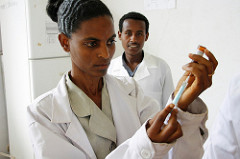Organisational evaluation
Organisations are ever-changing. Organisational evaluation provides an opportunity to step back and take stock of whether they are operating in line with their original vision and strategy. We have evaluated diverse organisations and supported their senior management to gain confidence and clarity in stepping forward into the future.
Use the filters below to explore our work on organisational evaluation.
Filter content:

Global Evaluation of UNICEF’s Water, Sanitation and Hygiene Programming in Protracted Crises, 2014-2019
The average humanitarian crisis, which requires a UN-coordinated response, lasts more than nine years. Vulnerability in such...

Evaluation, Learning, and Verification for Agency Reform (ELVAR)
DFID’s 2014 Strategy for Payment by Results states that the department will use PBR to improve the value for money of their...

Learning how to create a culture of learning
When we evaluated how the Norwegian Aid Administration practised Results-Based Management (RBM) earlier this year, one of our...

Evaluation of the Global Partnership for Sustainable Development Data (GPSDD)
Itad has been commissioned to design and conduct an evaluation of the Global Partnership for Sustainable Development Data (GPSDD).

Evaluation of the Gavi Alliance’s Gender Policy (2014-2018)
The Millennium Development Goal (MDG) 4, aimed to reduce by two-thirds, between 1990 and 2015, the global under-five mortality...

The Second Phase of Providing Monitoring, Evaluation and Learning Support to the Global Resilience Partnership
Since 2016, Itad has supported the Global Resilience Partnership (GRP) as a learning partner to help ensure it reaches its...

Executive summary: Nesta Impact Investments – Impact Strategy Audit Report
Itad conducted an Impact Strategy Audit of Nesta Impact Investments (NII). This assessed their use of the strategy and...

Evaluation of the Norwegian Aid Administration’s Practice of Results-Based Management
Results-based management (RBM) is a management strategy. It involves setting objectives, measuring achievement against these,...

Evaluation of ELMA-funded “Unfinished Business” Paediatric and Adolescent HIV Program
In 2016, there were approximately 1.8 million children under the age of 15 and 1.8 million adolescents aged 10-19 living with...

Annexes for the Final Evaluation of the Building Capacity to Use Research Evidence (BCURE) programme
This document contains the annexes to the full report 'Final Evaluation of the Building Capacity to Use Research Evidence...

Final Evaluation of the Building Capacity to Use Research Evidence (BCURE) Programme
This report presents summative findings from the independent realist evaluation of the Building Capacity to Use Research...

Meta-Evaluation of Global Affairs Canada’s Decentralized Evaluations
This report presents a review of decentralized evaluations over the period 2009–14. During this period, decentralized...

British International Investment’s mobilisation of private investment
Increasingly, international consensus is that private finance is critical to filling the development financing gap and...

Strategic Evaluation of the World Food Programme’s Support for Enhanced Resilience
Resilience is of growing importance globally (as highlighted in the June 2017 Report of the UN Secretary-General) and is seen...

Education Sector Budget Support Evaluation Programme in Zambia
From 2013 to 2016, the UK will support the improvement of education quality and participation of girls in the education system...

The Global Fund’s 2017 Strategic Review
The Global Fund to Fight AIDS, Tuberculosis and Malaria (the Global Fund) was created in 2002 to raise, manage and invest the...

